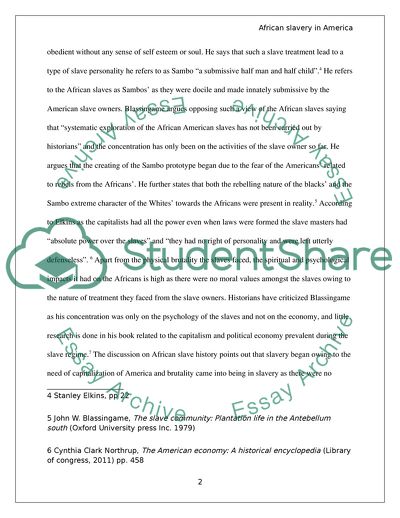Cite this document
(African Slavery in America - Reduction of Africans to Docile and Dependent Sambos Literature review Example | Topics and Well Written Essays - 1500 words, n.d.)
African Slavery in America - Reduction of Africans to Docile and Dependent Sambos Literature review Example | Topics and Well Written Essays - 1500 words. https://studentshare.org/history/1760863-3slavery-not-only-emasculated-the-african-but-his-personality-was-also-altered-and-he-was-reduced-to-a-docile-and-dependent-sambo-stanley-elkins-discuss-this-view-of-american-slavery
African Slavery in America - Reduction of Africans to Docile and Dependent Sambos Literature review Example | Topics and Well Written Essays - 1500 words. https://studentshare.org/history/1760863-3slavery-not-only-emasculated-the-african-but-his-personality-was-also-altered-and-he-was-reduced-to-a-docile-and-dependent-sambo-stanley-elkins-discuss-this-view-of-american-slavery
(African Slavery in America - Reduction of Africans to Docile and Dependent Sambos Literature Review Example | Topics and Well Written Essays - 1500 Words)
African Slavery in America - Reduction of Africans to Docile and Dependent Sambos Literature Review Example | Topics and Well Written Essays - 1500 Words. https://studentshare.org/history/1760863-3slavery-not-only-emasculated-the-african-but-his-personality-was-also-altered-and-he-was-reduced-to-a-docile-and-dependent-sambo-stanley-elkins-discuss-this-view-of-american-slavery.
African Slavery in America - Reduction of Africans to Docile and Dependent Sambos Literature Review Example | Topics and Well Written Essays - 1500 Words. https://studentshare.org/history/1760863-3slavery-not-only-emasculated-the-african-but-his-personality-was-also-altered-and-he-was-reduced-to-a-docile-and-dependent-sambo-stanley-elkins-discuss-this-view-of-american-slavery.
“African Slavery in America - Reduction of Africans to Docile and Dependent Sambos Literature Review Example | Topics and Well Written Essays - 1500 Words”. https://studentshare.org/history/1760863-3slavery-not-only-emasculated-the-african-but-his-personality-was-also-altered-and-he-was-reduced-to-a-docile-and-dependent-sambo-stanley-elkins-discuss-this-view-of-american-slavery.


